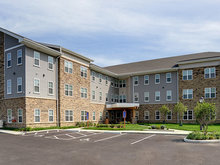Found 51 resources.
1
0
0

Lessons for funders and social change leaders in search of the best ways to collaborate across sectors to end homelessness.
Topics: Funding, Homelessness, Housing, Low-income, Supportive housing, Youth
 Shared by Sandra Ware
on Jan 3, 2023
Shared by Sandra Ware
on Jan 3, 2023 0
0
0
Created by the Older Americans Act in 1973, AAAs are part of the national Aging Network. AAAs are the local leaders that develop, coordinate, and deliver a wide range of home and community-based services. These services include information and referral/assistance, case management, home-delivered meals and meals in
congregate settings, in-home services, caregiver supports, transportation, evidence based health and wellness programs, long-term care ombudsman programs, and more. People who receive services provided by AAAs have improved health and well-being, helping them remain in their homes...
Topics: Disabilities, Food insecurity, Homelessness, Housing, Low-income, Seniors, Supportive housing
 Shared by Sandra Ware
on Oct 18, 2022
Shared by Sandra Ware
on Oct 18, 2022 0
0
0
Looking largely at the 2020-2021 school year, the report is chock-full of information about how schools apply research-based strategies in a variety of different contexts – from very different school systems across multiple states – to make research translate into positive experiences and outcomes for students and their teachers in three critical areas:
• Instructional work, where math or English-language-arts teams, including instructional coaches, special-education teachers, and English learner/multilingual teachers, work to improve the quality of instruction within classrooms.
• Early...
Topics: Advocacy, Attendance, Child welfare, CLPHA, Community development, Education, Grade-level proficiency, Housing, Literacy, Low-income, Partnerships, Place-based, Supportive housing, Sustainability, Youth
 Shared by Karina George
on Jun 29, 2022
Shared by Karina George
on Jun 29, 2022 0
1
1
In this webinar, we heard from the Housing Authority of the City of Austin about how they fund and sustain their resident programs. Head of Strategic Initiatives and Resource Development, Catherine Crago, discussed how their nonprofit subsidiary, Austin Pathways, assists with blending and braiding financing, including corporate and philanthropic funding and in-kind gifts.
This webinar is part on an ongoing series sponsored by the Housing Is Working Group. It is a collective of public housing authorities and non-profit organizations working in health, education, and housing sectors coming...
Topics: Advocacy, CLPHA, Data sharing, Housing, Housing Is Working Group, Legislation & Policy, Supportive housing, Sustainability
 Shared by Karina George
on Jun 21, 2022
Shared by Karina George
on Jun 21, 2022 0
0
0
When public libraries and public housing authorities intentionally join forces, the benefits are real and lasting for those living in public housing. This session highlights the partnership between Cuyahoga Metropolitan Housing Authority (CMHA) and Cleveland Public Library (CPL). CMHA and CPL executive leaders will discuss how their agencies strategically aligned their vision for impact and are meeting community needs through the library’s free and accessible resources. CMHA and CPL leaders will also share strategies for creating effective cross-sector partnerships that can drive greater...
Topics: Advocacy, Asset building, CLPHA, Education, Family engagement, Homelessness, Housing, Legislation & Policy, Literacy, Low-income, Supportive housing
 Shared by Karina George
on Jun 17, 2022
Shared by Karina George
on Jun 17, 2022 1
0
0
The Administration for Community Living’s Aging and Disability Network is a multifaceted service infrastructure for older adults and people with disabilities so they can find housing and obtain services like chore assistance, delivered meals, and transportation. By partnering with this community infrastructure, PHAs can improve voucher utilization and leverage and align resources so older adults, people with disabilities, and people experiencing homelessness —all priority populations for federal housing assistance—can obtain supportive services needed to attain housing stability, optimize...
Topics: Advocacy, Community development, Disabilities, Health, Housing, Partnerships, Research, Seniors, Supportive housing, Sustainability
 Shared by Karina George
on Jun 17, 2022
Shared by Karina George
on Jun 17, 2022 0
0
0
Housing providers are uniquely positioned to find innovative and meaningful ways to engage residents with lived experience in program design and implementation to ensure investments are focused, efficient, and culturally appropriate. Learn how the King County Housing Authority in Washington and The Community Builders in Cincinnati, OH are responding to the needs and desires of their residents in new ways that leverage the assets and strengths of their residents to ensure that young children thrive. Attendees will leave this session with new ideas to incorporate resident input in early...
Topics: Advocacy, CLPHA, Education, Family engagement, Housing, Low-income, Research, Supportive housing, Sustainability
 Shared by Karina George
on Jun 17, 2022
Shared by Karina George
on Jun 17, 2022 0
0
0
This panel discussion will examine the results of efforts to significantly expand the reach of HUD’s Family Self-Sufficiency Program through partnerships between the nonprofit Compass Working Capital and the Boston and Cambridge Housing Authorities. Panelists will discuss their program model and its evaluation, how they have scaled up FSS, what results they have experienced to date, and where they plan to go from here. An FSS program participant will participate in the panel and share their perspective on how the program has benefitted them.
Topics: Advocacy, Asset building, CLPHA, Early childhood, Education, Housing, Legislation & Policy, Research, Supportive housing
 Shared by Karina George
on Jun 17, 2022
Shared by Karina George
on Jun 17, 2022 0
0
0
The Low Income Investment Fund (LIIF) will moderate a unique cross-sector panel of housing and early care and education (ECE) experts on strategies and best practices for co-locating ECE facilities within affordable housing developments. Discussion of specific financing techniques and site design considerations from existing co-located facilities will provide attendees lessons on policy and programmatic changes needed to incentivize co-location. Panelists include innovators in affordable housing development, government and public sectors, early care and education operations, and community...
Topics: Advocacy, Broadband, Child welfare, CLPHA, Family engagement, Food insecurity, Health, Housing, Legislation & Policy, Low-income, Nutrition, School-readiness, Supportive housing, Sustainability
 Shared by Karina George
on Jun 17, 2022
Shared by Karina George
on Jun 17, 2022 0
0
0
Public and affordable housing agencies and organizations have the potential to serve as a crucial foundation for promoting early school success for economically challenged, fragile and otherwise marginalized children and families through a 24/7/365 multigenerational system of support and an ability to meet families 'where they are.' During this engaging session, Housing Is and our long-time partner The Campaign for Grade-Level Reading will elevate the critical importance of these housing-education partnerships, with special attention to the way in which such collaborations begin....
Topics: Advocacy, CLPHA, Early childhood, Education, Healthy homes, Housing, Low-income, Supportive housing, Sustainability
 Shared by Karina George
on Jun 17, 2022
Shared by Karina George
on Jun 17, 2022 0
0
0
In March 2020, the COVID-19 pandemic forced many public housing authorities (PHAs) to quickly adjust their operational procedures to protect their staff while providing emergency assistance to residents. Many PHAs had to close their offices and convert to remote operations almost overnight, while staff focused on supporting their tenants by delivering them food, doing wellness checks for vulnerable residents, and ensuring they had access to and in some cases providing the technology needed for children to attend school remotely and isolated residents to remain connected to friends, family,...
Topics: Advocacy, COVID-19, Data sharing, Health, Housing, Safety, Supportive housing
 Shared by Housing Is
on May 25, 2021
Shared by Housing Is
on May 25, 2021 0
0
0

Opened in summer 2018 on the north side of Columbus, Ohio, Laurel Green Apartments is an affordable permanent supportive housing development for residents with mental health conditions.
Topics: Homelessness, Housing, Low-income, Mental health, Supportive housing
 Shared by Housing Is
on Jun 11, 2019
Shared by Housing Is
on Jun 11, 2019 0
0
0
The role of public and nonprofit hospitals and hospital systems in supportive housing is not an obvious one at first glance. Traditionally, the role of nonprofit and public hospitals has been to provide primary healthcare and additional health services to the public, often to select “catchment” areas or neighborhoods. The extent of these institutions’ role in housing was limited to either providing a) short-term inpatient beds for medical or treatment services, or b) residences for nurses or other hospital staff. Why then are more and more nonprofit and public hospitals becoming involved in...
Topics: Health, Homelessness, Housing, Partnerships, Research, Supportive housing
 Shared by Housing Is
on Apr 17, 2019
Shared by Housing Is
on Apr 17, 2019 0
0
0
To better align families’ child welfare and supportive housing needs, child welfare leaders must clearly present their vision for the role of supportive housing as a part of positive child welfare outcomes. State administrators and leaders must consider critical aspects of housing within the Family First IV-E Prevention Program Five-Year State Plan (State Plan) and introduce necessary state policy, legislative, and budgetary changes to ensure that stable, supportive housing is central to long-term family stability and well-being
Topics: Child welfare, Family engagement, Housing, Legislation & Policy, Supportive housing
 Shared by Housing Is
on Apr 12, 2019
Shared by Housing Is
on Apr 12, 2019 0
0
0
The Keeping Families Together model turned the usual paradigm for prioritizing affordable housing on its head. Rather than targeting the most “stable” families, Keeping Families Together sought out families with the most complicated cases—those at greatest risk. Thanks to this approach, families once on the brink of crisis now have a permanent place to call home, as well as the services and support they need to stay together.
Topics: Child welfare, Family engagement, Homelessness, Housing, Low-income, Partnerships, Research, Supportive housing
 Shared by Housing Is
on Apr 4, 2019
Shared by Housing Is
on Apr 4, 2019 0
0
0
The Housing and Medicaid Services Pilot Program in Indianapolis, also known as the Blue Triangle Housing Program, is a collaboration that includes Anthem, the City of Indianapolis, a non-profit housing organization, and a community mental health center (CMHC).
Topics: Health, Housing, Medicaid / Medicare, Midwest, Partnerships, Supportive housing
 Shared by Housing Is
on Apr 4, 2019
Shared by Housing Is
on Apr 4, 2019 0
0
0
CSH selected the Center for Data Science and Public Policy (DSaPP) at the University of Chicago to develop a web-based data integration tool, which was completed in 2018. The tool connects county jail administrative data from the justice system to homeless system data, through communities’ Homeless Management Information Systems (HMIS).
Topics: Criminal justice, Data sharing, Homelessness, Housing, Midwest, Partnerships, Supportive housing
 Shared by Housing Is
on Apr 4, 2019
Shared by Housing Is
on Apr 4, 2019 0
0
0

The city says it plans to move ahead with a costly, stopgap renovation of a New Orleans jail building to house dozens of inmates with mental health issues — but it also wants to keep its options open.
Topics: Criminal justice, Housing, Legislation & Policy, Low-income, Mental health, South, Supportive housing
 Shared by Housing Is
on Feb 28, 2019
Shared by Housing Is
on Feb 28, 2019 0
0
0
A new collaboration of San Francisco Bay Area foundations and businesses is raising $540 million to tackle the region’s affordable housing crisis.
Topics: Community development, Health, Housing, Low-income, Partnerships, Supportive housing, West Coast
 Shared by Housing Is
on Jan 28, 2019
Shared by Housing Is
on Jan 28, 2019 0
0
0
To explore the benefits and challenges of rapid re-housing support services, How Housing Matters asked a group of experts to weigh in. Contributing to the discussion are Kathryn Monet, chief executive officer at the National Coalition for Homeless Veterans, Jacob Donnelly, director of supportive services at Swords to Plowshares, and Samantha Batko, research associate at the Urban Institute.
Topics: Asset building, Health, Homelessness, Housing, Low-income, Supportive housing, Workforce development
 Shared by Housing Is
on Jan 24, 2019
Shared by Housing Is
on Jan 24, 2019 0
0
0
In 2018, over half a million people experienced homelessness on a given night in the US. Of those, roughly one in three experienced unsheltered homelessness in a car, outside, or in other places not meant for human habitation.
Topics: Homelessness, Housing, Low-income, Stability, Supportive housing
 Shared by Housing Is
on Jan 17, 2019
Shared by Housing Is
on Jan 17, 2019 0
0
0
Webinar slide deck that provides a brief overview of FUP, building blocks of successful FUP voucher implementation, facilitated panel on increasing impact and enhancing FUP operations, and other opportunities and resources.
Topics: Child welfare, CLPHA, Foster care, Funding, Housing, Legislation & Policy, Low-income, Partnerships, Preventative care, Safety, Supportive housing, Youth
0
0
0
Denver’s expansion of supportive housing through the Denver Supportive Housing Social Impact Bond Initiative is beginning to pay off for the city of Denver, its homeless residents, and a group of investors banking on social impact. This fact sheet highlights interim results of the program.
Topics: Housing, Research, Supportive housing, West Coast
0
0
0
Housing instability among families and children can be detrimental to child welfare, health, economic, and other outcomes. Policymakers and service providers in these fields should consider weaving housing into their approaches. Treating instability at its roots can relieve the trade-offs and stress that emerge when no decent housing is affordable. Evidence indicates that affordable housing can improve a range of outcomes for families and—in combination with short-term or long-term services—help providers tackle complex challenges head-on.
Topics: Child welfare, Family engagement, Housing, Low-income, Stability, Supportive housing
0
0
0

People with mental health disabilities are vastly overrepresented in the population of people who experience homelessness. Of the more than 550,000 people in America who experienced homelessness on a given night in 2017, 1 in 5 had a mental illness. The proportion of people experiencing chronic homelessness with mental health disabilities was even higher—nearly 1 in 3. Despite this fact, the reality is that most people with mental illness fortunately do not experience homelessness: While about 20 percent of all adults in the United States have a mental illness, less than two-tenths of 1...
Topics: Depression, Disabilities, Homelessness, Housing, Legislation & Policy, Low-income, Mental health, Partnerships, Preventative care, Stability, Substance abuse, Supportive housing
